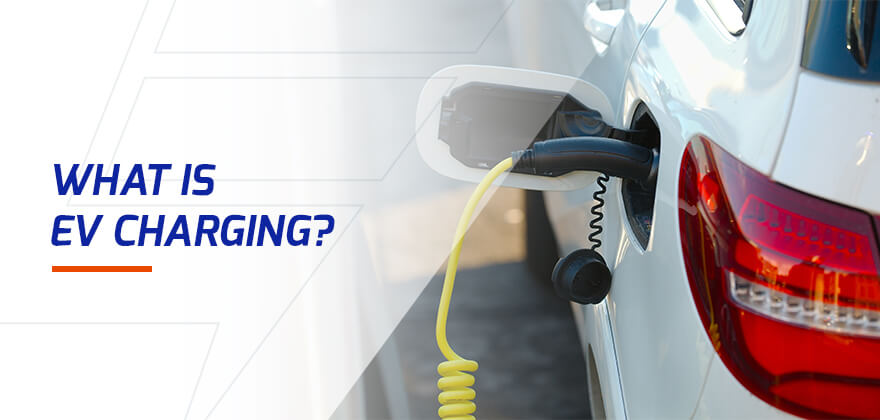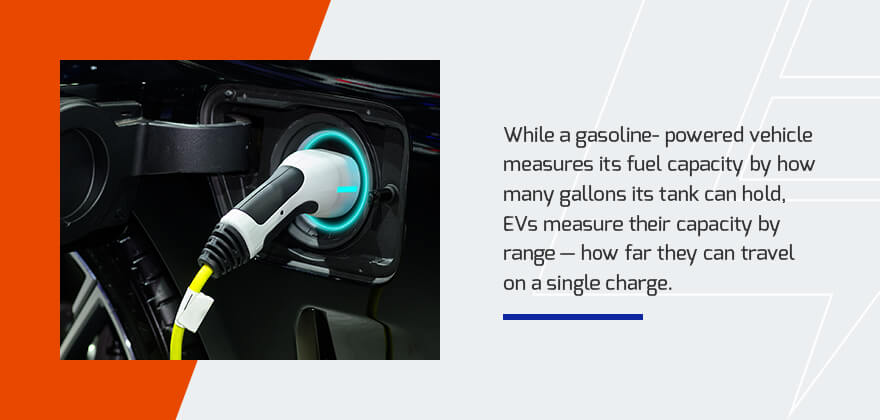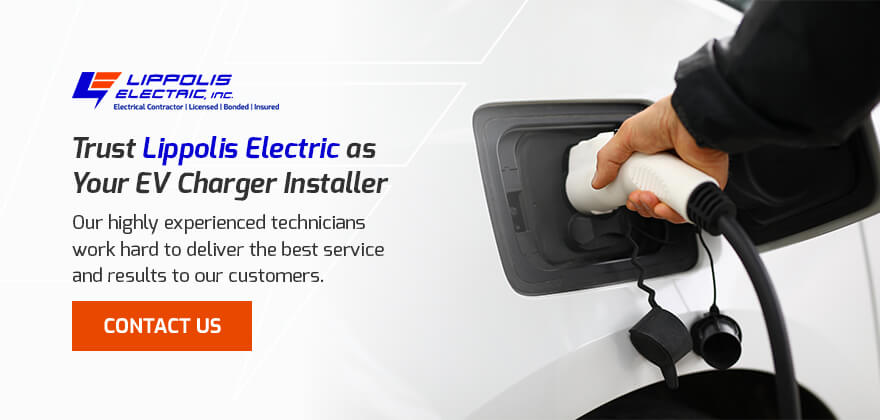What Is EV Charging?

Most Americans are familiar with gas-powered cars and have access to millions of gas stations. However, charging an electric vehicle (EV) currently takes more planning than refueling a gas-powered one.
While EVs are a relatively new technology, their popularity is growing, and more charging stations are cropping up in many cities and towns. If your business is considering an EV charging station, the guide below will help you learn the basics about where and how to charge it.
Table of Contents
- What Is an EV Charger?
- How Does EV Charging Work?
- How Do Public EV Charging Stations Work?
- How Much Does It Cost to Charge an EV?
- Charger Levels
- Charger Plugs
- How Long Does It Take to Charge an Electric Car?
What Is an EV Charger?
You can think of an EV charger as a scaled-up version of a charging cable for your laptop, phone or tablet.
Like any other electric device, EVs need to connect to a power source to fill their battery. The charger delivers electricity to the vehicle, letting its battery charge the same way your phone charges when you plug it in.
How Does EV Charging Work?
All EVs, even plug-in hybrids that can run on gas, need a charger to refill their battery.
Plugging in your vehicle to an electric car charging station is simple. Once you plug in your car, the charger will pull an electrical current from a 240v outlet or directly from the power grid. A light on the charger or an internal display will indicate when your vehicle has finished charging.

While a gasoline-powered vehicle measures its fuel capacity by how many gallons its tank can hold, EVs measure their capacity by range — how far they can travel on a single charge. An EV’s charging rate is represented in terms of distance over time. For example, you may be able to recharge the battery at 20 miles per hour.
How Do Public EV Charging Stations Work?
Public charging stations are locations where drivers can charge their cars on trips where a single charge might not get them to their destination. You can usually find public EV charging stations in well-traveled areas, such as parking lots, shopping centers and restaurants. Some workplaces or universities may work with EV charging companies to install a charger on their campuses for employee and student convenience.
Public and home EV charging stations work the same way. Once your find a public station, you simply plug in your car and go about your day.
How Much Does It Cost to Charge an EV?
Charging costs can vary based on your location. Some charging stations may be subscription-based or pay-as-you-go. The property owners, networks or EV charging station companies typically set the price.
Some EV manufacturers, such as Tesla or Nissan, provide complimentary public charging at some locations. Some states also offer rebates for public EV charging as they do for green energy and solar use. For example, California’s Clean Vehicle Rebate Program offers up to $7,000 to individuals who purchase zero-emission vehicles, including plug-in hybrids. These incentives can help offset the cost of charging your car in public spaces. Check the rebates and incentives available in your state to see how you can benefit.
Charger Levels
Electric vehicle chargers deliver electricity at different rates, divided into three levels.
Level One
At 3 to 5 miles per hour, level one chargers provide the slowest charge out of all the levels. However, these chargers are more available than the other levels and can fulfill some people’s charging needs. An EV may require multiple days of charging to reach a full battery with a level one charger, so it’s not ideal for people who drive frequently. However, these chargers are a good option for people who can let their vehicle sit for longer between uses.
Level Two
Level two chargers are easy to find, especially in cities and major highways. At 12-80 miles per hour, they fill your battery much more quickly than level one chargers. Many people who own an EV will have a level two charger in their home or garage.
Level two chargers can easily charge your vehicle overnight or during the workday, so you have a full battery as soon as you wake up or get off your shift.
Since level two chargers are standard at many public charging stations, they’re often the most affordable.
Level Three
Level three chargers charge an EV quickly and efficiently. With speeds of 3-20 miles per minute, you can charge your EV in just a couple of hours or less. However, since level three charges so fast, they often cost the most. If you’re using a level three charger to fill your battery, you might pay as much as you would to refill a standard gas-powered vehicle.
Most people who drive EVs don’t use these vehicles to take long road trips, so you probably won’t need to fill your car using a level three charger. Instead, you can use these chargers to top off your battery.
Some EVs are equipped to handle level three chargers and their voltage. Consult your manufactures guide to determine if level three chargers are suitable for your vehicle.
Charger Plugs
EVs will also have different plugs depending on the make and model. Like chargers, there are three types of plugs:
- Combined charging system (CCS)
- CHAdeMO
- Tesla
However, these plug shapes only matter for level three chargers. Level two chargers only require a J1772 plug.
How Long Does It Take to Charge an Electric Car?
Charging to a full battery can take anywhere between 20 minutes and 50 hours, depending on:
- Current battery status: It takes longer to charge an empty battery than a battery that still has half of its maximum charge.
- Battery size: Smaller batteries will charge more quickly than batteries with a larger capacity.
- Charging rates: Each EV has a peak charging rate and a charging curve — the fastest it can charge and how much power it draws over time. Similarly, each charging station has a maximum speed for delivering its charge. If you’re at a charging station with a lower rate than recommended for your vehicle, it will take longer to charge to full battery.
- Weather: Colder temperatures can slow charging speeds, even when using a rapid charger.
Plan With Public EV Charging Stations in Mind
Whether you’re planning a trip or just driving around the city, it’s always good to know where public charging stations are. The U.S Department of Energy has comprised a list of all EV charging stations in the U.S. You can narrow down the results using your location, charger level and plug type.
You can also use apps to find a charging station near you. These apps are especially helpful when you’re on a road trip and need to find a charging station along your route.
Trust Lippolis Electric as Your EV Charger Installer
Installing a home EV charging station can help you keep your battery charged for all your needs, whether you’re driving to and from work, dropping the kids off at school or planning a big road trip. Lippolis Electric has the electrical contracting experience to install a ChargePoint charger in your garage or parking area, so you always have it when you need to refill.
Our highly experienced technicians work hard to deliver the best service and results to our customers. You can contact our technicians 24 hours a day for expert advice or professional service if you ever need it. Contact us today to request an estimate or schedule a service.
Schedule service
Please note that your appointment is not set until confirmed by Lippolis Electric shortly after you've submitted the form.
| ‹ | › | |||||
| Sun | Mon | Tue | Wed | Thu | Fri | Sat |


